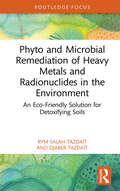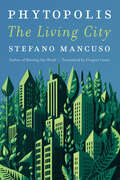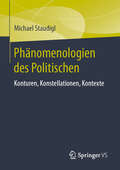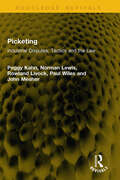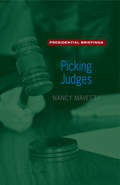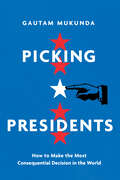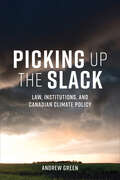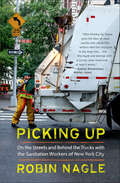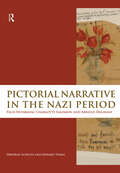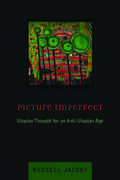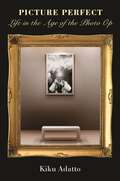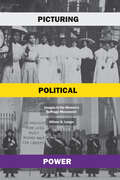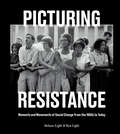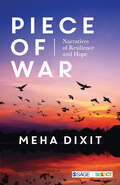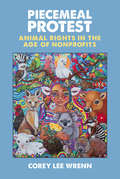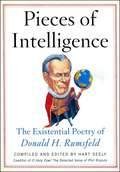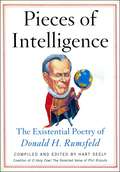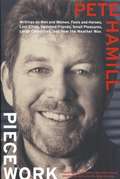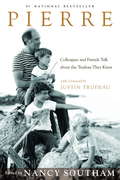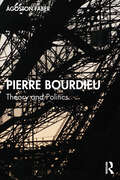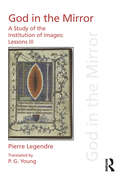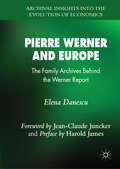- Table View
- List View
Phyto and Microbial Remediation of Heavy Metals and Radionuclides in the Environment: An Eco-Friendly Solution for Detoxifying Soils (Routledge Focus on Environment and Sustainability)
by Rym Salah-Tazdaït Djaber TazdaïtThis book examines the role that bioremediation can play in the detoxification of soil, water, and air to improve environmental and human health, with a specific focus on heavy metals and radionuclides. Environmental pollution, whether by natural or human causes, with industrial activities being a key player, is a challenge facing all nations across the world. While treatment has typically required the use of expensive technology, one promising solution is the use of phytoremediation, in which plants act by metabolizing or sequestering pollutants. This eco-friendly solution is a good alternative to the standard methods of soil and water treatments. This book provides not only the basic definitions and classification of technologies used for contaminant remediation but also the most recent studies dealing with the selection of new promising microbial stains and plant varieties involved in the treatment of radioactive and heavy metal contaminants. It provides a detailed description of the biochemical mechanisms and genes involved in the bioremediation of radionuclides and heavy metals, offering a clear insight for academics and practitioners interested in in vitro and in situ biological treatment. This book will be of great value to students and scholars interested in environmental pollution and environmental health from across a range of different disciplines, including environmental microbiology and chemistry, ecology and environmental science, biological and environmental engineering and biotechnology.
Phytopolis: The Living City
by Stefano MancusoA renowned plant expert explains how we can make urgent, positive changes to our cities that protect against and reduce global warming.The conquest of new lands has been the greatest occupation of our species: for hundreds of thousands of years, humans have searched for new territories to inhabit, finding in the city the best place to live in the last hundred years. Looking at the parabola of our geographical expansion, it appears that humans have gone from being a generalist species, capable of colonizing any environment, to very quickly becoming a specialized species, capable of thriving only within a particular habitat. The city seems to have become the only place where we can expect to thrive and reproduce, because it is the only place where our specialization gives us the best chance of survival, and quality of life.However, &“species specialization&” is effective only in a stable environment: in changing environmental conditions, it becomes dangerous. And if the resources the city needs to thrive are not unlimited, global warming can permanently change the environment of our cities—an event that would be fatal. But it is the city itself, as it is today, that is the main driver of environmental destruction. Humankind is confronted with a paradox: we must rethink our cities and make them a lasting ecological niche.In this clear, accessible, and fascinating work, Stefano Mancuso proposes a green solution: how would our cities be transformed if their framework were modeled on plants?
Phänomenologien des Politischen: Konturen, Konstellationen, Kontexte
by Michael StaudiglDer vorliegende Band bietet einen Überblick über das gegenwärtig an Kontur gewinnende Forschungsfeld einer Phänomenologie des Politischen. Der Diskussion zentraler Methodenfragen wird dabei ebenso Raum gewidmet, wie der Präsentation aktueller Debatten und interdisziplinärer Themenstellungen, die sich im Zeichen einer v.a. gendertheoretisch und postkolonial motivierten Politisierung der Phänomenologie herauskristallisiert haben, in Kontexten globaler "Polykrise", "Rückkehr der Religion" und "Postfaktizität" aktuell noch an Relevanz gewinnen. Methodisch leitend ist angesichts solcher Grenzprobleme eine Annäherung an das Politische in Form eines Zwischenphänomens, das sich binären Deutungen radikal entzieht und so dazu anhält, die genannten Problemlagen konstruktiv ins Auge zu fassen. In Form von Schwerpunkten fokussiert der Band entsprechend Konstellationen des Politischen, wie sie sich exemplarisch zwischen Verfahrensordnungen und ereignishafter Performanz, affektivem Anstoß und emotiver Resonanz, Innen und Außen, Immanenz des Diskurses und transzendierender Sinngebung entfalten.
Picketing: Industrial Disputes, Tactics and the Law (Routledge Revivals)
by Norman Lewis Peggy Kahn Rowland Livock Paul Wiles John MesherFirst published in 1983, Picketing stands as the pioneering comprehensive analysis of industrial dispute tactics in modern British labour relations. At its core, the study examines the 1980 Employment Act—legislation specifically designed to restrict picketing activities and secondary actions by trade unions. The authors provide a thorough investigation of the political, legal, and economic foundations that shaped this legislative strategy. The authors examine what were the effects on industrial disputes in the two years after the passing of the Act, by observing such disputes and explaining what impact the new law had on the behaviour of all parties: workers, trade union officials, management and police.The exceptional depth and breadth of this study offers an unparalleled foundation for analyzing the Conservative Government's industrial relations approach and the broader role of legal frameworks in labour disputes. As Britain continues to face industrial decline, persistent unemployment, and ongoing attempts at reforming labour relations through legislation, picketing remains a central issue in contemporary political discourse. This volume provides an essential critical framework for scholars, policymakers, and labour relations professionals seeking to understand the complex interplay between law, industrial action, and economic policy in modern Britain.
Picking Judges (Presidential Briefings Ser.)
by Nancy MaveetyWhat defines a president? Is it policymaking? A good relationship with the American people? Or is it legacy? Most would argue that legacy imprints a president in the American consciousness. A president's federal judicial appointees may be his or her most lasting political legacy. Because federal judges serve for life, their legal policymaking endures long after a president's term in office is over. Presidents who care about serving their mandate, who desire to maximize their policy agenda, and who wish to influence the nation's constitutional fabric appoint as many federal judges as possible.This new volume in the Presidential Briefings series shows how the president's appointment power has expanded beyond its bare constitutional outlines. In exercising their constitutional powers while paying heed to political opportunities, presidents and the Senate have together created our modern judicial appointment politics. Presidents consider a host of demographic and ideological factors, candidate qualities, and electoral politics.Nancy Maveety examines the dynamics of screening and choosing judicial nominees and analyses the institutional calculus in securing their confirmation in the face of senatorial obstruction. Maveety shows how a president can adapt to particular circumstances and provides an outline for synergistically staffing the federal judiciary, thus securing a legacy for all time.
Picking Presidents: How to Make the Most Consequential Decision in the World
by Gautam MukundaCelebrated leadership expert and political scientist Gautam Mukunda provides a comprehensive, objective, and non-partisan method for answering the most important question in the world: is someone up to the job of president of the United States? In Picking Presidents, Gautam Mukunda sets his sights on presidential candidates, proposing an objective and tested method to assess whether they will succeed or fail if they win the White House. Combining political science, psychology, organizational behavior, and economics, Picking Presidents will enable every American to cast an informed vote. In his 2012 book Indispensable, which all but predicted the Trump presidency, Mukunda explained how both the very best and very worst leaders are "unfiltered"—outsiders who take power without the understanding or support of traditional elites. Picking Presidents provides deep analysis of filtered and unfiltered presidents alike, from failed haberdasher and skillful president Harry Truman, to the exceptionally well-qualified—and ultimately reviled—James Buchanan; from Andrew Johnson, who set civil rights back by a century, to Theodore Roosevelt, who evaded party opposition to transform American society. Picking Presidents lays out a clear framework that anyone can use to judge a candidate and answer the all-important question: are they up to the job?
Picking Up the Slack: Law, Institutions, and Canadian Climate Policy (UTP Insights)
by Andrew GreenCanada has over-promised and under-delivered on climate change, setting weak goals and allowing carve-outs, exceptions, and exemptions to undermine its climate policies. Why, in an era when climate change is front of mind for so many people, have we failed to make progress? This question has been the source of heated debate across the political spectrum. In Picking Up the Slack, Andrew Green draws together different perspectives on the challenge facing Canada to offer an accessible account of the ideas and institutions that have impeded climate change action. Picking Up the Slack embraces the complexity of the problem, showing that its sources lie deep in Canada’s institutional arrangements – pointing to the role played by federal-provincial power sharing arrangements, the heavy reliance on discretion in Canadian law, the role of the courts, and the impact of social norms. Working from a broad perspective that incorporates the insights of economics, law, political science, and philosophy, Green unpacks the features of Canadian policy making that determine the successes and failures of climate policies. His message is ultimately optimistic: Picking Up the Slack sheds light on how we can bring about meaningful movement towards a fair and positive future.
Picking Up: On the Streets and Behind the Trucks with the Sanitation Workers of New York City
by Robin NagleA “gripping” behind-the-scenes look at New York’s sanitation workers by an anthropologist who joined the force (Robert Sullivan, author of Rats).America’s largest city generates garbage in torrents—11,000 tons from households each day on average. But New Yorkers don’t give it much attention. They leave their trash on the curb or drop it in a litter basket, and promptly forget about it. And why not? On a schedule so regular you could almost set your watch by it, someone always comes to take it away.But who, exactly, is that someone? And why is he—or she—so unknown?In Picking Up, the anthropologist Robin Nagle introduces us to the men and women of New York City’s Department of Sanitation and makes clear why this small army of uniformed workers is the most important labor force on the streets. Seeking to understand every aspect of the Department’s mission, Nagle accompanied crews on their routes, questioned supervisors and commissioners, and listened to story after story about blizzards, hazardous wastes, and the insults of everyday New Yorkers. But the more time she spent with the DSNY, the more Nagle realized that observing wasn’t quite enough—so she joined the force herself. Driving the hulking trucks, she obtained an insider’s perspective on the complex kinships, arcane rules, and obscure lingo unique to the realm of sanitation workers.Nagle chronicles New York City’s four-hundred-year struggle with trash, and traces the city’s waste-management efforts from a time when filth overwhelmed the streets to the far more rigorous practices of today, when the Big Apple is as clean as it’s ever been.“An intimate look at the mostly male work force as they risk injury and endure insult while doing the city’s dirty work [and] a fascinating capsule history of the department.” —Publishers Weekly“[Nagle’s] passion for the subject really comes to life.” —The New York Times“Evokes the physical and psychological toll of this dangerous, filthy, necessary work.” —Nature“Nagle joins the likes of Jane Jacobs and Jacob Riis, writers with the chutzpah to dig deep into the Rube Goldberg machine we call the Big Apple and emerge with a lyrical, clear-eyed look at how it works.” — Mother Jones
Pictorial Narrative in the Nazi Period: Felix Nussbaum, Charlotte Salomon and Arnold Daghani
by Edward Timms Deborah SchultzThis book investigates creative responses to the Nazi period in the work of three artists, Felix Nussbaum, Charlotte Salomon and Arnold Daghani, focusing on their use of pictorial narrative. It analyses their contrasting aesthetic strategies and their innovative forms of artistic production. In contrast with the autonomous, modernist art object, their works were explicitly linked with the historical conditions under which they were produced – the pressures of persecution and exile. Conditions in the slave labour camps and ghettos in the Ukraine, which shaped the paintings and drawings of Daghani, are contrasted with the experiences of exile in Belgium and France, which inspired Nussbaum and Salomon. In defiance of conventional artistic practice, they produced word-image combinations that can be read as narrative sequences, incorporating specific references to political events. While there has been a wealth of literary, philosophical and historical studies relating to the Holocaust, aesthetic debate has developed less extensively. This is the first comparative study of three artists who are only belatedly achieving recognition and the recent reception of their work is evaluated. By identifying the aesthetic principles and narrative strategies underlying their work, the book reassesses their achievement in creating new forms of modernism with an unmistakable political momentum.This book was published as a special issue of Word & Image.
Picture Imperfect: Utopian Thought for an Anti-Utopian Age
by Russell JacobyPicture Imperfect Utopianism suffers from an image problem: A recent exhibition on utopias in Paris and New York included photographs of Hitler's Mein Kampf and a Nazi concentration camp. Many observers judge utopians and their sympathizers as foolhardy dreamers at best and murderous totalitarians at worst. However, as noted social critic and historian Russell Jacoby argues in this salient, polemical, and innovative work, not only has utopianism been unfairly characterized, a return to an iconoclastic utopian spirit is vital for today's society. Shaped by the works of Theodor Adorno, Walter Benjamin, Ernst Bloch, Gustav Landauer, and other predominantly Jewish thinkers, iconoclastic utopianism revives society's dormant political imagination and offers hope for a better future. Writing against the grain of history, Jacoby reexamines the anti-utopian mindset and identifies how utopian thought came to be regarded with such suspicion. He challenges standard readings of such anti-utopian classics as 1984 and Brave New World and offers stinging critiques of the influential liberal and anti-utopian theorists Hannah Arendt, Isaiah Berlin, and Karl Popper. He argues that these thinkers mistakenly equate utopianism with totalitarianism.The reputation of utopian thought has also suffered from the failures of, what Jacoby terms, the blueprint utopian tradition and its oppressive emphasis on detailing all aspects of society and providing fantastic images of the future. In contrast, the iconoclastic utopians, like those who follow God's prohibition against graven images, resist both the blueprinters' obsession with detail and the modern seduction of images. Jacoby suggests that by learning from the hopeful spirit of iconoclastic utopians and their willingness to accept new possibilities for society, we open ourselves to new and more imaginative ideas of the future.
Picture Perfect: Book 12 (Secret Princesses #12)
by Rosie BanksA gorgeous new series about magical princesses and best friends. Best friends Charlotte and Mia can't bear it when Charlotte's family moves far away. But when they become trainee Secret Princesses they begin an amazing adventure together - and they can see each other whenever they like!Mean Princess Poison has cast a spell on four of the Secret Princesses and made them forget all about their magic. Can the girls break Princess Poison's spell and grant a wish for another girl just like them?
Picture Perfect: Life in the Age of the Photo Op - New Edition
by Kiku AdattoWe say the camera doesn't lie, but we also know that pictures distort and deceive. In Picture Perfect, Kiku Adatto brilliantly examines the use and abuse of images today. Ranging from family albums to Facebook, political campaigns to popular movies, images of war to pictures of protest. Adatto reveals how the line between the person and the pose, the real and the fake, news and entertainment is increasingly blurred. New technologies make it easier than ever to capture, manipulate, and spread images. But even in the age of the Internet, we still seek authentic pictures and believe in the camera's promise to document, witness, and interpret our lives.
Picturing Political Power: Images in the Women’s Suffrage Movement
by Allison K. LangeFor as long as women have battled for equitable political representation in America, those battles have been defined by images—whether illustrations, engravings, photographs, or colorful chromolithograph posters. Some of these pictures have been flattering, many have been condescending, and others downright incendiary. They have drawn upon prevailing cultural ideas of women’s perceived roles and abilities and often have been circulated with pointedly political objectives. Picturing Political Power offers perhaps the most comprehensive analysis yet of the connection between images, gender, and power. In this examination of the fights that led to the ratification of the Nineteenth Amendment in 1920, Allison K. Lange explores how suffragists pioneered one of the first extensive visual campaigns in modern American history. She shows how pictures, from early engravings and photographs to colorful posters, proved central to suffragists’ efforts to change expectations for women, fighting back against the accepted norms of their times. In seeking to transform notions of womanhood and win the right to vote, white suffragists emphasized the compatibility of voting and motherhood, while Sojourner Truth and other leading suffragists of color employed pictures to secure respect and authority. Picturing Political Power demonstrates the centrality of visual politics to American women’s campaigns throughout the nineteenth and early twentieth centuries, revealing the power of images to change history.
Picturing Reform in Victorian Britain
by Janice CarlisleHow did Victorians, as creators and viewers of images, visualize the politics of franchise reform? This study of Victorian art and parliamentary politics, specifically in the 1840s and 1860s, answers that question by viewing the First and Second Reform Acts from the perspectives offered by Ruskin's political theories of art and Bagehot's visual theory of politics. Combining subjects and approaches characteristic of art history, political history, literary criticism, and cultural critique, Picturing Reform in Victorian Britain treats both paintings and wood engravings, particularly those published in Punch and the Illustrated London News. Carlisle analyzes unlikely pairings - a novel by Trollope and a painting by Hayter, an engraving after Leech and a high-society portrait by Landseer - to argue that such conjunctions marked both everyday life in Victorian Britain and the nature of its visual politics as it was manifested in the myriad heterogeneous and often incongruous images of illustrated journalism.
Picturing Resistance: Moments and Movements of Social Change from the 1950s to Today
by Ken Light Melanie LightA compelling photographic history of the important moments of progressive resistance--from the civil rights movement to the present--to inspire the change-makers and activists of today.A powerful commemoration of notable moments of protest, Picturing Resistance highlights the important American social justice movements of the last seven decades. Including both black-and-white and color photographs, this important record pairs iconic and unexpected images with insightful narrative captions that contextualize the meanings behind the moments. UC Berkeley Graduate School of Journalism professor Ken Light and author Melanie Light have carefully curated unconventional photographs of the most memorable moments in twentieth- and twenty-first-century protest history, offering a fresh perspective on these important occasions. In place of the iconic image of Martin Luther King, Jr. speaking at the March on Washington, Picturing Resistance conveys the feeling of pain and frustration of the time period by instead showing him moments after being arrested, restrained against a police station table. The moments captured in Picturing Resistance take the reader on a journey through decades of people-powered protest, featuring images from the front lines of the civil rights, women's, environmental, and disability rights movements, as well as contemporary movements like Black Lives Matter and March for Our Lives. Picturing Resistance will inspire revolutionary thinkers, activists, and dreamers of all stripes to celebrate the milestones of the past as we build a progressive future.
Piece of War: Narratives of Resilience and Hope
by Meha DixitThroughout history war has affected civilizations in many ways. In contemporary times, Afghanistan, the Kashmir Valley, parts of Middle East and Africa continue to be embroiled in conflict. It makes you ask the question: Is there an ‘ordinary’ life beyond violence in these conflict zones? Through the real-life stories of people, the book attempts to uncover the human aspect of war, and how individuals and communities make sense of and cope with the pain and uncertainty. In this book, narratives of people who have either lived or are living in conflict zones are presented in an anecdotal manner, highlighting the extraordinary resilience humankind possesses and its ability to survive amidst despair and destruction. Documenting the author’s first-hand experience of confronting the realities of conflict-affected and ‘post-conflict’ regions of the Middle East, South Asia and West Africa (Afghanistan, Afghanistan–Pakistan border, Lebanon, Lebanon–Syria border, Sierra Leone, Indo-Pakistan border, Kashmir, Chhattisgarh, Jharkhand, Odisha and Rohingya refugees along Bangladesh–Myanmar border), the book is a raw and bleeding portrayal of hope and strength. Piece of War will be a heartfelt and introspective read for all readers, and an analytical read especially for psychologists, anthropologists and journalists.
Piecemeal Protest: Animal Rights in the Age of Nonprofits
by Corey Lee WrennGiven their tendency to splinter over tactics and goals, social movements are rarely unified. Following the modern Western animal rights movement over thirty years, Corey Lee Wrenn applies the sociological theory of Bourdieu, Goffman, Weber, and contemporary social movement researchers to examine structural conditions in the animal rights movement, facilitating factionalism in today’s era of professionalized advocacy. Modern social movements are dominated by bureaucratically oriented nonprofits, a special arrangement that creates tension between activists and movement elites who compete for success in a corporate political arena. Piecemeal Protest examines the impact of nonprofitization on factionalism and a movement’s ability to mobilize, resonate, and succeed. Wrenn’s exhaustive analysis of archival movement literature and exclusive interviews with movement leaders illustrate how entities with greater symbolic capital are positioned to monopolize claims-making, disempower competitors, and replicate hegemonic power, eroding democratic access to dialogue and decision-making essential for movement health. Piecemeal Protest examines social movement behavior shaped by capitalist ideologies and state interests. As power concentrates to the disadvantage of marginalized factions in the modern social movement arena, Piecemeal Protest shines light on processes of factionalism and considers how, in the age of nonprofits, intra-movement inequality could stifle social progress.
Pieces of Intelligence The Existential Poetry of Donald H. Rumsfeld
by Hart SeelyFor all its known and unknown unknowns, Pieces of Intelligence is less about national affairs than about the poet himself. From the era when gas stations held "little things" of glass to the leak-filled corridors of present-day Washington, Rumsfeld stands out as a man whose quest for real answers long ago required the kinds of questions no reporter dared to ask. "What in the world am I doing here?" he says, in "A Confession." His answer is no less a riddle. "It's a big surprise," and nothing more. Sometimes comic, sometimes dark, D. H. Rumsfeld's poetry is irreverent but always relevant, occasionally structurally challenged and always structurally challenging. Pieces of Intelligence is the U.S. defense secretary's long-awaited first collection, combining precision-guided insights and a revolution in metaphorical affairs, to take the reader on a dazzling journey of the spoken verse.
Pieces of Intelligence: The Existential Poetry of Donald H. Rumsfeld
by Hart SeelyDonald Rumsfeld is not just a two-time Secretary of Defence, former CEO, former White House Chief of Staff, and the most outspoken and forceful civilian military leader in recent American history. He is also, intentionally or not, a poet. At last, the ubiquitous and at times unintelligible U.S. Secretary of Defence has been deciphered by humorist Hart Seely, who found that the rambling raconteur is best understood when set in verse. Seely uncovers zen poems and lyrics, haikus and sonnets and has plucked the golden apples from 'D.H.' Rumsfeld's tree to present over 100 hilarious gems drawn from Rummy's public statements. Whether you love him or hate him, they're irresistible. As we know, There are known knowns. There are things we know we know. We also know There are known unknowns. That is to say We know there are some things We do not know. But there are also unknown unknowns, The ones we don't know we don't know.
Piecework: Writings on Men & Women, Fools and Heroes, Lost Cities, Vanished Calamities and How the Weather Was
by Pete HamillVeteran journalist Pete Hamill has never covered just politics. Or just sports. Or just the entertainment business, the mob, foreign affairs, social issues, the art world, or New York City. He has in fact written about all these subjects, and many more, in his years as a contributor to such national magazines as Esquire, Vanity Fair, and New York, and as a columnist at the New York Post, the New York Daily News, the Village Voice, and other newspapers. Seasoned by more than thirty years as a New York newspaperman, Hamill writes on an extraordinarily wide variety of topics in powerful language that is personal, tough-minded, clearheaded, always provocative. Piecework is a rich and varied collection of Hamill's best writing since 1970, on such diverse subjects as what television and crack have in common, why winning isn't everything, stickball, Nicaragua, Donald Trump, why American immigration policy toward Mexico is all wrong, Brooklyn's Seventh Avenue, and Frank Sinatra, not to mention Octavio Paz, what it's like to realize you're middle-aged, Northern Ireland, New York City then and now, how Mike Tyson spent his time in prison, and much more. This collection proves him once again to be among the last of a dying breed: the old-school generalist, who writes about anything and everything, guided only by passionate and boundless curiosity. Piecework is Hamill at his very best.
Piero Gleijeses' International History of the Cold War in Southern Africa, Omnibus E-Book
by Piero GleijesesThis Omnibus E-Book brings together Piero Gleijeses's two landmark books for the first time:Visions of Freedom: Havana, Washington, Pretoria, and the Struggle for Southern Africa, 1976-1991During the final fifteen years of the Cold War, southern Africa underwent a period of upheaval, with dramatic twists and turns in relations between the superpowers. Americans, Cubans, Soviets, and Africans fought over the future of Angola, where tens of thousands of Cuban soldiers were stationed, and over the decolonization of Namibia, Africa's last colony. Beyond lay the great prize: South Africa. Piero Gleijeses uses archival sources, particularly from the United States, South Africa, and the closed Cuban archives, to provide an unprecedented international history of this important theater of the late Cold War.Conflicting Missions: Havana, Washington, and Africa, 1959-1976This sweeping history of Cuban policy in Africa from 1959 to 1976 is based on unprecedented research in African, Cuban, and American archives. (Among Gleijeses's many sources are Cuban archival materials to which he is the only non-Cuban to ever have access.) Setting his story within the context of U.S. policy toward both Africa and Cuba during the Cold War, Gleijeses challenges the notion that Cuban policy in Africa was directed by the Soviet Union.
Pierre
by Nancy Southam#1 national bestsellerWhen Pierre Elliott Trudeau died in 2000, the outpouring of emotion was extraordinary. Thousands of people across Canada -- and all over the world -- mourned the loss of one of our greatest prime ministers, a man who touched the hearts and challenged the minds of a nation. In this book, Trudeau's close friend Nancy Southam has gathered more than 140 reminiscences and anecdotal narratives from journalists, former world leaders, politicians who battled and debated him, his sons' friends, RCMP bodyguards, girlfriends, canoeing buddies, and household staff. Among the contributors are luminaries as diverse as Conrad Black, Jean Chrétien, Leonard Cohen, John Kenneth Galbraith, Ivan Head, Jacques Hébert, Karen Kain, Margot Kidder, Harrison McCain, Toni Onley, Gordon Pinsent, Christopher Plummer, Roy Romanow, Ed Schreyer, and Barbra Streisand. With the blessing of his sons, Justin and Sacha, Southam has put together a remarkably transparent account of a deeply private person that is funny, honest, affectionate, and illuminating.From the Trade Paperback edition.
Pierre Bourdieu: Theory and Politics
by Ágoston FáberPierre Bourdieu is one of the most prominent figures in 20th-century sociology. His influence remains substantial even after his death in 2002, and his views and findings continue to divide sociologists to this day.This book examines the issue of Bourdieu’s so-called “political turn,” a significant topic in the French press and academic world. It explores whether the relationship between Pierre Bourdieu's increasingly visible political engagement from the mid-1990s and his earlier scientific work should be understood in terms of continuity or discontinuity.To investigate this specific issue, it is essential to discuss some basic concepts and significant insights of Bourdieu's social theory. The book also considers the robustness of Bourdieu’s theoretical framework and his criticisms of neoliberal capitalism from the perspective of Luc Boltanski’s competing pragmatic sociology.The book concludes that although Bourdieu, as a devoted left-wing intellectual, saw the possibility of resisting the neoliberal world order through mass mobilisation, inciting masses to collective action remains problematic within his sociological and anthropological framework. Through a systematic discussion of Bourdieu’s theory, the book offers insights into the relationship between science and politics and hopes to provide an opportunity for a deeper understanding of his work.
Pierre Legendre Lessons III God in the Mirror: A Study of the Institution of Images (Discourses Of Law Ser.)
by Pierre LegendreIn the context of our increasingly global legal order, Pierre Legendre’s God in the Mirror reconsiders the place of law within the division of existing bodies of knowledge. Navigating the texts of Ovid, Augustine, Roman jurists, medieval canon lawyers, Freud, Lacan, the notebooks of Leonardo de Vinci, and the paintings of Magritte, this third volume of Pierre Legendre’s Lessons focuses on the relation of the subject to the institution of images. Legendre tracks the origins and vicissitudes of the specular metaphor within western history, carrying out a critique of its dependence on the discourse of the Imago Dei. A crucial landmark within Legendre’s ongoing reconsideration of a medieval ‘revolution of interpretation’, this book dissociates the western normative tradition from its mythic foundation, separating theology and law. It thereby documents the advent of modern rational doubt, as a new legal foundation or ground: one that, for Legendre, was not only a revolutionary invention, but one that produced the modern European idea of the State.
Pierre Werner and Europe: The Family Archives Behind the Werner Report (Archival Insights into the Evolution of Economics)
by Elena DanescuThis book examines the European vocation and achievements of Pierre Werner (1913–2002), former Prime Minister, Finance Minister and Foreign Minister of Luxembourg, unanimously recognized as one of the architects of Economic and Monetary Union. The author makes extensive use of Pierre Werner’s previously unpublished archives belonging to the Werner family, opened for the first time for research purposes. The book analyses the Werner Report, negotiations within the Werner Committee, the emergence of the Committee’s views on EMU, their political commitment to a European currency, the similarities and differences between their ideas, their personal networks, the influence of the states they represented, their theoretical and methodological input and their contribution to the political consensus.Chapters shed new light on various aspects of the European integration process and also on the role of Luxembourg and its European policy. In addition, the author has carried out a series of original interviews with Luxembourg and European figures who share their memories and thoughts concerning Pierre Werner, his achievements and his views on the European integration process, and also other topics such as Economic and Monetary Union and Luxembourg‘s European policy. This book will be of interest and value to researchers, EU policy makers and students in the fields of political economy, political science, economic history and history of economic thought.
